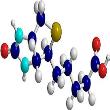
Contrary to earlier findings, a new high-quality study shows that taking high-dose biotin does not reduce disability in people with progressive multiple sclerosis (MS). It’s important to understand this new evidence.
Previous, low-quality clinical studies showed that taking 300 mg of biotin daily for 12 months could reduce disability in some patients with MS. But there were also concerns that it might increase the risk for relapse. This new high-quality trial was randomized, double-blinded, and placebo-controlled and enrolled over 600 patients at 90 centers in 13 different countries. It showed that taking 100 mg of biotin three times daily for 15 months doesn’t reduce disability. Nor did it find a link between biotin use and an increased risk for relapse. Some speculate that the reason for the link between biotin and increased relapse in previous research might have been due to patients discontinuing disease-modifying drugs while taking biotin.
If patients ask about high-dose biotin for MS, tell them that the latest and highest-quality evidence shows that it won’t help. Additionally, taking high-dose biotin is known to interfere with a number of lab tests - there were 25 instances of inaccurate lab results for patients taking high-dose biotin in this new study alone. If patients still want to give it a try, recommend they focus on incorporating biotin-rich dietary sources rather than supplements, such as organ meats, eggs, fish, seeds, and nuts. And advise patients to stick to adequate intake levels - 30 mcg for adults daily.
Related topic:
The information in this brief report is intended for informational purposes only, and is meant to help users better understand health concerns. This information should not be interpreted as specific medical advice. Users should consult with a qualified healthcare provider for specific questions regarding therapies, diagnosis and/or health conditions, prior to making therapeutic decisions. Copyright © 2025 NatMed. Commercial distribution or reproduction prohibited. NatMed is the leading provider of high-quality, evidence-based, clinically-relevant information on natural medicine, dietary supplements, herbs, vitamins, minerals, functional foods, diets, complementary practices, CAM modalities, exercises and medical conditions. Monograph sections include interactions with herbs, drugs, foods and labs, contraindications, depletions, dosing, toxicology, adverse effects, pregnancy and lactation data, synonyms, safety and effectiveness.
